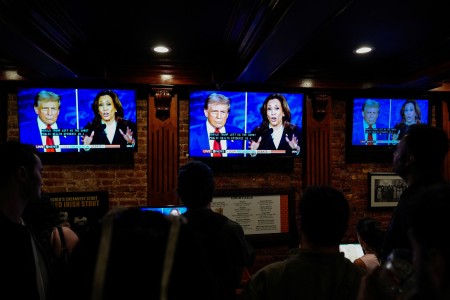By Jason Lange
WASHINGTON (Reuters) -Democratic U.S. Vice President Kamala Harris leads Republican Donald Trump 47% to 42% in the race to win the Nov. 5 presidential election, increasing her advantage after a debate against the former president that voters largely think she won, according to a Reuters/Ipsos poll that closed on Thursday.
The two-day poll showed Harris with a five percentage point lead among registered voters, just above the four-point advantage she had over Trump in an Aug. 21-28 Reuters/Ipsos poll.
Among voters who said they had heard at least something about Tuesday’s debate, 53% said Harris won and 24% said Trump won, with the rest saying neither had or not answering. Some 52% of respondents said that Trump stumbled and didn’t appear sharp, while 21% said that of Harris.
Harris, 59, put Trump, 78, on the defensive in a combative presidential debate with a stream of attacks on his fitness for office and his myriad legal woes.
Many Republicans were also not convinced about their candidate’s performance in the debate in Philadelphia. Some 53% of Republican voters in the poll said Trump won the debate, compared to 91% of Democrats who said she was the victor. Among Republicans, 31% said no one won and 14% said Harris got the better of Trump.
Ninety-one percent of registered voters in the poll said they had heard at least something of the debate and 44% said they had heard a great deal. The debate, hosted by ABC News, attracted 67.1 million television viewers, according to Nielsen data, topping the roughly 51 million people who watched Trump debate then-candidate President Joe Biden in June.
Biden’s disastrous performance in that debate led to widespread calls by fellow Democrats for him to drop his re-election bid, which he did in June.
Voters generally gave Harris better marks than Trump on how she carried herself. Asked which of the two appeared more dignified, 56% of people familiar with the debate picked Harris, compared to 24% who picked Trump. Forty-nine percent said Harris “seemed like someone who would listen to me and understand my concerns,” compared to 18% who saw Trump that way.
The poll surveyed 1,690 U.S. adults nationwide, including 1,405 registered voters. It had a margin of error of around three percentage points for registered voters.
While national surveys including Reuters/Ipsos’ polls give important signals on the views of the electorate, the state-by-state results of the Electoral College determine the winner, with a handful of battleground states likely to be decisive.
(Reporting by Jason Lange; Editing by Scott Malone and Alistair Bell)





